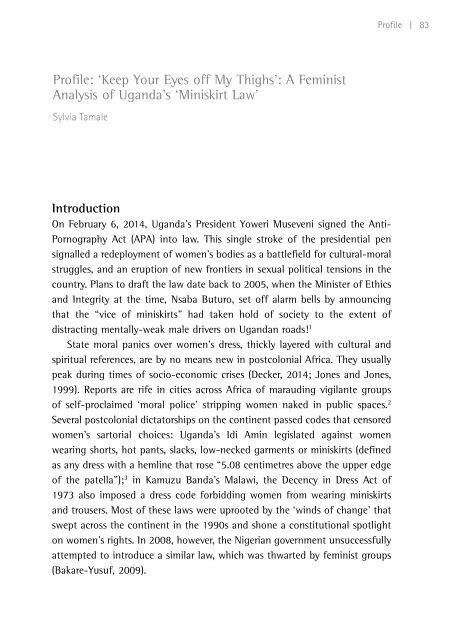The politics of fashion and beauty in Africa
fa21_proof_3
fa21_proof_3
Create successful ePaper yourself
Turn your PDF publications into a flip-book with our unique Google optimized e-Paper software.
Pr<strong>of</strong>ile | 83<br />
Pr<strong>of</strong>ile: ‘Keep Your Eyes <strong>of</strong>f My Thighs’: A Fem<strong>in</strong>ist<br />
Analysis <strong>of</strong> Ug<strong>and</strong>a’s ‘M<strong>in</strong>iskirt Law’<br />
Sylvia Tamale<br />
Introduction<br />
On February 6, 2014, Ug<strong>and</strong>a’s President Yoweri Museveni signed the Anti-<br />
Pornography Act (APA) <strong>in</strong>to law. This s<strong>in</strong>gle stroke <strong>of</strong> the presidential pen<br />
signalled a redeployment <strong>of</strong> women’s bodies as a battlefield for cultural-moral<br />
struggles, <strong>and</strong> an eruption <strong>of</strong> new frontiers <strong>in</strong> sexual political tensions <strong>in</strong> the<br />
country. Plans to draft the law date back to 2005, when the M<strong>in</strong>ister <strong>of</strong> Ethics<br />
<strong>and</strong> Integrity at the time, Nsaba Buturo, set <strong>of</strong>f alarm bells by announc<strong>in</strong>g<br />
that the “vice <strong>of</strong> m<strong>in</strong>iskirts” had taken hold <strong>of</strong> society to the extent <strong>of</strong><br />
distract<strong>in</strong>g mentally-weak male drivers on Ug<strong>and</strong>an roads! 1<br />
State moral panics over women’s dress, thickly layered with cultural <strong>and</strong><br />
spiritual references, are by no means new <strong>in</strong> postcolonial <strong>Africa</strong>. <strong>The</strong>y usually<br />
peak dur<strong>in</strong>g times <strong>of</strong> socio-economic crises (Decker, 2014; Jones <strong>and</strong> Jones,<br />
1999). Reports are rife <strong>in</strong> cities across <strong>Africa</strong> <strong>of</strong> maraud<strong>in</strong>g vigilante groups<br />
<strong>of</strong> self-proclaimed ‘moral police’ stripp<strong>in</strong>g women naked <strong>in</strong> public spaces. 2<br />
Several postcolonial dictatorships on the cont<strong>in</strong>ent passed codes that censored<br />
women’s sartorial choices: Ug<strong>and</strong>a’s Idi Am<strong>in</strong> legislated aga<strong>in</strong>st women<br />
wear<strong>in</strong>g shorts, hot pants, slacks, low-necked garments or m<strong>in</strong>iskirts (def<strong>in</strong>ed<br />
as any dress with a heml<strong>in</strong>e that rose “5.08 centimetres above the upper edge<br />
<strong>of</strong> the patella”); 3 <strong>in</strong> Kamuzu B<strong>and</strong>a’s Malawi, the Decency <strong>in</strong> Dress Act <strong>of</strong><br />
1973 also imposed a dress code forbidd<strong>in</strong>g women from wear<strong>in</strong>g m<strong>in</strong>iskirts<br />
<strong>and</strong> trousers. Most <strong>of</strong> these laws were uprooted by the ‘w<strong>in</strong>ds <strong>of</strong> change’ that<br />
swept across the cont<strong>in</strong>ent <strong>in</strong> the 1990s <strong>and</strong> shone a constitutional spotlight<br />
on women’s rights. In 2008, however, the Nigerian government unsuccessfully<br />
attempted to <strong>in</strong>troduce a similar law, which was thwarted by fem<strong>in</strong>ist groups<br />
(Bakare-Yusuf, 2009).



